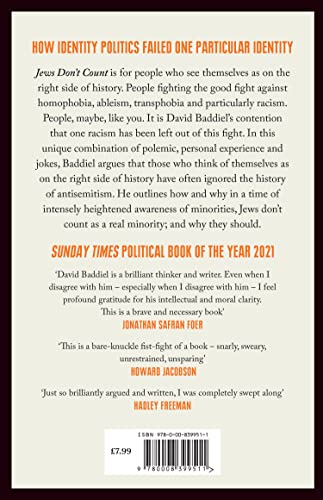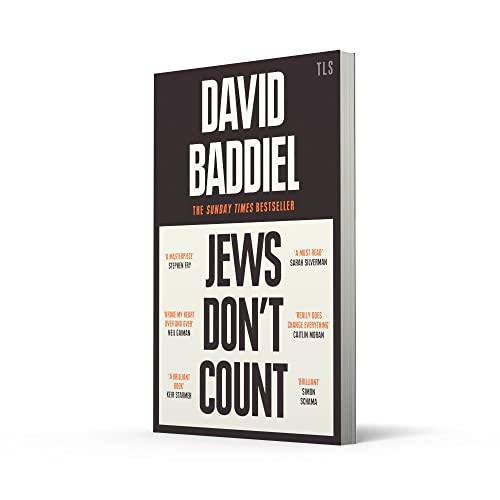Jews Don’t Count: Sunday Times Paperbacks of the Year 2022
£7.15£7.99 (-11%)
How identity politics failed one particular identity.
‘a must read and if you think YOU don’t need to read it, that’s just the clue to know you do.’ SARAH SILVERMAN
‘a masterpiece.’
STEPHEN FRY
Jews Don’t Count is a book for people on the right side of history. People fighting the good fight against homophobia, disablism, transphobia and, particularly, racism. People, possibly, like you.
It is the comedian and writer David Baddiel’s contention that one type of racism has been left out of this fight. In his unique combination of reasoning, polemic, personal experience and jokes, Baddiel argues that those who think of themselves as on the right side of history have often ignored the history of anti-Semitism. He outlines why and how, in a time of intensely heightened awareness of minorities, Jews don’t count as a real minority.
David Baddiel’s book ‘The God Desire’ was a Sunday Times bestseller w/c 17-04-2023.
Read more
Additional information
| Publisher | WilliamCollins (3 Feb. 2022) |
|---|---|
| Language | English |
| Paperback | 160 pages |
| ISBN-10 | 0008399514 |
| ISBN-13 | 978-0008399511 |
| Dimensions | 12.9 x 1.02 x 19.8 cm |



















by firstyke
Of great importance now, and its relevance for the last two millennia can’t be overstated enough.
For the interest of transparency, I’m not a Jew.
And if you find the word Jew uncomfortable, please read this book.
by Marshall Lord
David Baddiel’s powerful book “Jews don’t count.” argues that many people who would describe themselves as progressive anti racists pay significantly less attention to what has been historically one of the worst and most murderous forms of racism than to almost all others.
Baddiel makes a convincing argument that on all sides of the political spectrum there is an extraordinary capacity even of people who are generally strongly and genuinely opposed to racism to fail to consider Jewish people, or to forget about, fail to notice, or downplay racism against Jews in a way that they would never do about almost any other form of racism.
In some ways it is more alarming that this blind spot applies not just to downright Anti-Semites but to people who had no intention of being racist. Individuals who will instantly apologise and make an effort to adjust their behavior if anyone calls them on it – which strongly suggests that nobody ever has.
He quotes the Guardian’s Hadley Freeman: “Would addressing bigotry against any other minority be seen by the self-described anti-racist left as an unfortunate distraction, or is it just Anti-Semitism?”
Baddiel is a football fan and writes about the experiences he and his brother had of racism on the terraces. Not all that long ago racist chanting and abuse was completely endemic throughout football. The problem hasn’t been completely stamped out but enormous efforts to reduce it have been made.
Except, he argues, for Anti-Semitic abuse. I do not claim to know a lot about football, and I do not know first hand how widespread is Baddiel’s experience that officials and fans tolerate abusive comments against Jews which they would never tolerate against any other minority, But I know enough to take David Baddiel’s points seriously, because I do know there is at least some truth in what he writes about the club which a member of my immediate family supports – Spurs (Tottenham Hotspur Football Club.)
Spurs is based in a part of North London which has a significant Jewish population and has come to be seen by rival fans as a “Jewish” club, even though it isn’t. That includes some people referring to the club and it’s supporters by a word beginning with “Y” which is an insulting name for Jewish people – and which I am not going to write here, any more than I would write the equivalent insulting word for a black person beginning with “N.”
Baddiel argues that there has been more tolerance of this – and indeed failure on the part of people who would not deliberately support any kind of racism to spot the problem – than there would be for other forms of racism. It may be an education issue; it may be that, because the word does not provoke the level of response that most other such words do; not everyone even knows that it is a racial slur.
The club itself is sufficiently bothered by this that quite recently – to be precise, in December 2020 which is between the date Baddiel submitted the last parts of the book to his publishers and the date it was published – Spurs adopted the IHRA definition of Anti-Semitism to reinforce its commitment that “The Club has a zero tolerance approach to anti-Semitism as well as any other form of discrimination.”
It is quite extraordinary that prejudice against the race who were the main victims of the worst act of genocide in history should be the very same prejudice that many people apparently forget to consider when talking about racism. Yet this book makes a strong case that this is exactly what happens.
The title of David Baddiel’s book was perfectly illustrated by a barrage of tweets the very weekend I was writing this review from Labour MPs and activists about their new Scottish leader.
The day before I posted this Anas Sarwar was elected as the new leader of the Scottish Labour party.
Perfectly OK for Labour supporters or anyone else to welcome his election. But extraordinary, and just plain wrong, for Labour MPs and activists from the party’s Deputy Leader Angela Rayner down to describe him as
“the first ever ethnic minority leader of a political party anywhere in the UK.”
Nonsense.
The first ever ethnic minority leader of a political party anywhere in the UK took office a hundred and fifty three years before when Benjamin Disraeli became Prime Minister and leader of his party.
Some people argued that he doesn’t count as a Jew or as a member of an ethnic minority because he converted to the Church of England. That is silly. Disraeli didn’t stop being the target of Anti-Semitism, didn’t stop being proud of his Jewish heritage and didn’t stop describing himself and being described by others as a Jew when he joined the Anglican church.
Once he was on the receiving end of an insult in the House of Commons from the leader of the Irish nationalists which included mention of his Jewish ancestry, and he replied
“Yes, I am a Jew,”
and added that his ancestors “were priests in the temple of Solomon.”
I can think of at least three other people from ethnic minorities who became leaders of UK political parties. The second leader of a political party from an Ethnic minority was Herbert Samuel, ninety years ago. A third was Michael Howard.
Anas Sarwar isn’t even the first national leader of the Labour party for the UK or one of the four nations who was a member of an ethnic minority – Ed Miliband beat him to that distinction in 2010.
Disraeli, Samuel, Howard, Miliband, all ignored by Angela Rayner and others. Now what do the four leaders these people were leaving out today have in common?
You guessed it: they were all Jewish. It’s as if the people tweeting this weekend were using the title of David Baddiel’s book: “Jews don’t count” as an axiom where being a member of an ethnic minority is concerned.
Perhaps the saddest part of the book is the very last page. He refers to the fact that as a young person growing up, Baddiel greatly enjoyed the “Citizen Smith” comedy TV show about a young would-be revolutionary, “Wolfie Smith” played by Robert Lindsay. Wolfie Smith was, for him, a hero.
The day after the Equalities and human rights commission – an official body set up and operating under laws which the last Labour government itself had put onto the statue book, published a damning report into the failure of the Labour party to deal with Anti-Semitism, Robert Lindsey tweeted in defence of the party leader on whose watch that failure had occurred.
Baddiel concludes his book as follows:
“So obviously I know that was an actor playing a part. I know that was fifty years ago. But still, on realising that for Wolfie Smith, Jews don’t count, a tiny part of me died.”
by Esther Reeves
A fabulous insight in to antisemitism and what it is to be a Jew.
by lynn morgan
The premise of the book isn’t entirely accurate. There are other marginalised groups including Catholics in Scotland specifically. The author gives lots of examples and raises a lot of valid points but ultimately its not the only oppresses religion – never mind minority.
by CN
David Baddiel is a secular Jew with no interest in religion nor in the State of Israel. This excellent and thought provoking book explores the racism or anti-Semitism experienced by the Jewish community in Britain. He challenges this racism which is accepted and practised by people who are passionate anti racists. In recent times this has increased and several Jewish MPs have experienced huge amounts of hatred through social media especially. Primary schools have had to have a lot of security which in this supposedly tolerant society is wrong. There is of course a long nurtured myth linking Jews with the death of Jesus of Nazareth. Jesus was 100% Jewish but of course a long time ago you werent allowed to say that he was killed by the Romans, especially when Constantine decided that everyone should be a Christian. The book is well written and interesting.
by Clarkie
This is such a comprehensive and easily digestible study of how anti-semitism is often discarded or unseen, or placed as a non issue in the seemingly “progressive” political sphere.
I found it completely fascinating and eye opening, one thing I will think about every day as the new troubles in Gaza are happening and the anti-zionism inevitably veers into anti-semitism is to “look for the ancient trope”, when the conversation moves away from the Israeli government and towards “the Jews” and how to see it when they try to hide it. As well as the courage to increasingly step in and confront it.
by peterflo
I started this book with misconceptions about the prevalence of the racism experienced by the Jewish community and I have to admit that the author quickly convinced me of the error of my ways. Many valid points are raised but although the book raises the awareness of antisemitism it would have been improved by offering some answers to the questions raised. In our modern society people seem to be adept at defining a problem with all it’s nuances but we all seem to lack the foresight to provide a way to a solution, me included. We are all unique in some way but we need to focus on the fact that we are all part of the human race.
by Rob S
Interesting book well argued. Certainly made me think about many people’s lack of awareness on anti – Jewish racism. Would recommend reading it.